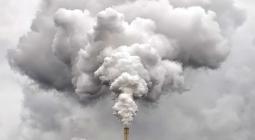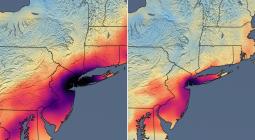Coronavirus had bigger impact on CO2 emissions than Second World War, study reveals.

Real-time data show huge side effects of international confinements, curfews and quarantines
As countries around the world first grappled with the unfolding Coronavirus pandemic and initiated mass lockdowns upon billions of people earlier this year, one of the major side effects was an unprecedented decline in CO2 emissions.
By April 2020, around half of all humanity — around 3.9 billion people — had been asked or ordered to stay at home by their governments in an effort to slow the spread of the contagious virus.
Schools and universities shut, swathes of businesses and industries were closed, and as populations isolated themselves and dealt with the appalling human impact of the disease, levels of pollution from human activity plunged.
A new study reveals the extent of the decline in CO2 emissions, which researchers say was ‘unprecedented’ and bigger than the impact of the financial crisis of 2008, the oil crisis of 1979 — when oil production slumped after the Iranian revolution, or even the Second World War.
An international team of researchers has found that in the first six months of this year, 8.8 per cent less carbon dioxide was emitted than in the same period in 2019 — a total decrease of 1.5 billion tons.
The scientists said the study is based on “near-real-time data” collected by Carbon Monitor — an international initiative that provides daily estimates of the world’s CO2 emissions.
“What makes our study unique is the analysis of meticulously collected near-real-time data,” said lead author Zhu Liu from the Department of Earth System Science at Tsinghua University in Beijing.
“By looking at the daily figures compiled by the Carbon Monitor research initiative, we were able to get a much faster and more accurate overview, including timelines that show how emissions decreases have corresponded to lockdown measures in each country.”
In April, at the height of the first wave of coronavirus infections, when most major countries shut down their public life and parts of their economy, emissions even declined by 16.9 per cent.
The research revealed the various outbreaks resulted in CO2 emissions drops normally only seen on a short-term basis during holidays like Christmas or the Chinese Spring Festival.
It also shows which parts of the global economy were most impacted.
“The greatest reduction of emissions was observed in the ground transportation sector,” said Professor Daniel Kammen, of the Goldman School of Public Policy at the University of California, Berkeley.
“Largely because of working from home restrictions, transport CO2 emissions decreased by 40 per cent worldwide.”
In contrast, the power and industry sectors contributed less to the decline, Professor Kammen said. They fell by 22 per cent and 17 per cent respectively, and aviation and shipping emissions also declined.
The scientists said even the residential sector saw a small emissions drop of 3 per cent, largely because of an abnormally warm winter in the northern hemisphere. Heating energy consumption decreased, with most people staying at home all day during lockdown periods.
Alongside the Carbon Monitor data, the researchers based their overall estimates for CO2 decreases on a wide array of data: precise, hourly datasets of electricity power production in 31 countries, daily vehicle traffic in more than 400 cities worldwide, daily global passenger flights, monthly production data for industry in 62 countries as well as fuel consumption data for building emissions in more than 200 countries.
The researchers also found strong rebound effects when lockdowns were lifted.
With the exception of a continuing decrease of emissions stemming from the transportation sector, by July 2020, as soon as lockdown measures were lifted, most economies resumed their usual levels of emitting CO2.
But the scientists said even if the emissions had remained at the historically low levels observed, this would have “a rather minuscule effect” on the long-term CO2 concentration in the atmosphere.
Therefore, the authors stressed that the “only valid strategy to stabilise the climate is a complete overhaul of the industry and commerce sector”.
“While the CO2 drop is unprecedented, decreases of human activities cannot be the answer,” said co-author Hans Joachim Schellnhuber, founding director of the Potsdam Institute for Climate Impact Research.
“Instead we need structural and transformational changes in our energy production and consumption systems. Individual behavior is certainly important, but what we really need to focus on is reducing the carbon intensity of our global economy.”
The research is published in the journal Nature.
15 October 2020
THE INDEPENDENT




